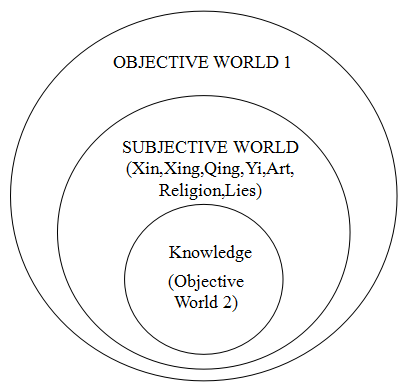




In the subjective world, the Xing of people (nature, needs, interests) and emotion are the id; the feeling, thought, attitude, will, decision, experience and idea are the ego; the vision and science, art, religion of thought products are the superego.
8.3 Dialectical Relation of Two Worlds
There are the sun, the moon, the stars, tables, chairs and human society in the objective world, and there is the human brain, the movement of brain and the consciousness generated by brain movement. Human consciousness produces the
subjective world, in which there is what I see and think. I see tables and chairs, I see people and their behaviors, I see the sun, the moon and the stars, I think of the Big Bang, I think of the wave-particle duality of light and so on. These things constitute the objective world, which is inside the subjective world. This objective world is objective world 2. The real objective world is objective world 1.

Figure 2. Dialectical Relation of the Two World.
The objective world we think and talk about is not the real objective world, but is made of our experience, ideas and theories. Now let’s look at the objective world 1. Is the objective world 1 really objective? The objective world 1 we’re talking about here is also something we’re thinking about. I wouldn’t be able to say it if I hadn’t thought about it. Now that I’m thinking and talking about the objective world 1, it is also part of the subjective world, essentially it is objective world 2. That is to say, there is a subjective world outside the objective world 1, and there is an objective world outside the subjective world. And so on, layer upon layer nesting, endless loop. The relation between the subjective world and the objective world belongs to the dialectical unity relation, or the relation between matter and consciousness is the dialectical unity relation. Laozi said, "Tao is a Yin and a Yang." This is the world view of dialectical dualism, the most fundamental and overall world view that metaphysics of philosophy should present to the public.